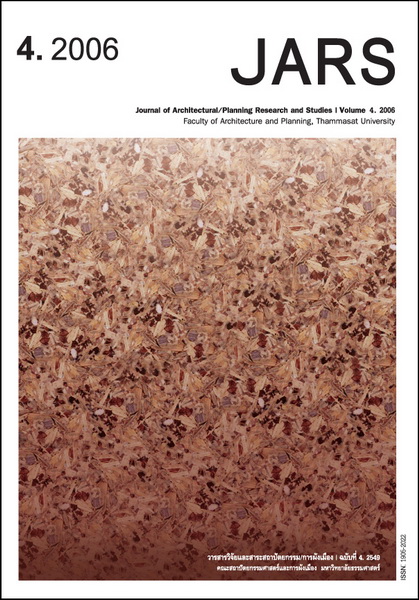Communities’ Environment Improvement Network: Strategy and Process toward Sustainable Urban Poor Housing Development
Main Article Content
Abstract
“Baan Mankong” program is presently the government’s major policy in urban poor housing
development in Thailand, undertaken by Community Organization Development Institute (CODI). The main
strategy of the program is to upgrade living conditions, secure tenure as well as community capacity
building through communities’ self-proposed projects and people participation process. This paper is
derived from the experience in the development practice of a case study on Bang Bua canal in Bangkok,
where on both sides of the waterfront are presently illegally occupied by a group of neighborhoods. These
communities have invaded into public land and settled their housing trespassing into the canal. The
previous attempts by the local authority to evict the waterfront urban poor communities, for being the
cause of water pollutions and other associated environmental problems, had led to a long conflict in urban
development.
To achieve the goals of sustainable community development, it is vital that not only the core
problems of urban poor housing such as the lack of secure tenure and development funding are systematically
solved, but also to evoke residents’ participation and people awareness on environment related issues.
The Bang Boa community development scheme under the “Baan ManKong” program is expected to highlight
initial guidelines and strategies for urban poor settlements’ redevelopment of other waterfront area of
Bangkok. This paper will discuss how the process of community capacity building and empowerment have
been undertaken and will be initiated, particularly in establishing various networks as a significant
development strategy.
Downloads
Article Details

This work is licensed under a Creative Commons Attribution-NonCommercial-NoDerivatives 4.0 International License.
All material is licensed under the terms of the Creative Commons Attribution 4.0 International (CC-BY-NC-ND 4.0) License, unless otherwise stated. As such, authors are free to share, copy, and redistribute the material in any medium or format. The authors must give appropriate credit, provide a link to the license, and indicate if changes were made. The authors may do so in any reasonable manner, but not in any way that suggests the licensor endorses you or your use. The authors may not use the material for commercial purposes. If the authors remix, transform, or build upon the material, they may not distribute the modified material, unless permission is obtained from JARS. Final, accepted versions of the paper may be posted on third party repositories, provided appropriate acknowledgement to the original source is clearly noted.
References
Roovers, H. et.al. (1989). Alternatives to Eviction of Klong Settlements in Bangkok. Third World Planning Review. (11-2), 3-4.
Community Organization Development Institute. (2004). Special Issue on Community Upgrading in Thailand. CODI Update No. 4, June, 1-2.
Yap, K.S. (1992). Low-Income Housing in Bangkok: A Review of Some Housing Sub-Markets. Bangkok: Division of Human Settlements Development, AIT.
Satterthwaite, D. (2005). Baan Mankong: The national programme for upgrading and secure tenure in Thailand’s cities. Document on World Wide Web, URL: http://www.codi.or.th index.php? option= com_content&task=view&id=216&Itemid=52.
Boonyabancha, S. (1999). Citizen’s Network to Address Urban Poverty in Thailand. Manila Social Forum: The New Social Agenda for East and Southeast Asia, November, 8-12.


